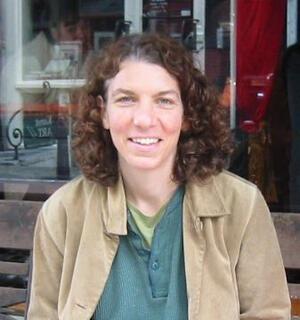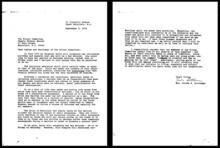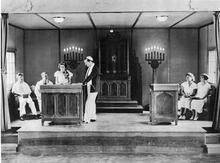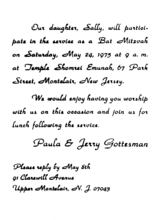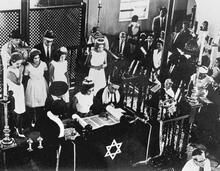Sally Gottesman
Non-profit entrepreneur Sally Gottesman, the oldest of four daughters of Jerome (Jerry) Gottesman and Paula Rachlin Gottesman, is an amalgam of her parents’ strongest impulses: entrepreneurialism and generosity. After she advocated to be the first Shabbat morning bat mitzvah at her New Jersey synagogue in 1974, Gottesman’s passion around gender and Judaism grew to characterize her deep volunteer and philanthropic pursuits. Since becoming a parent herself, she has expanded her community work to include questions of justice in Israel and healthcare advocacy.
Sally Gottesman is a volunteer-philanthropist-activist focused on gender and justice in the Jewish community. Despite her significant philanthropic commitments, Gottesman’s hands-on approach is fueled by the belief that her opinion “isn’t worth a dime” if it isn’t paired with her time and work toward that cause. Thus, she has founded several organizations and worked to propel many others to have greater impact and reach through her investments of both time and money.
A Family Legacy
Gottesman is an amalgam of her parents’ strongest impulses: entrepreneurialism and generosity. Her father (along with his brother, Harold) was a founder of Edison Properties, which opened its first parking garage in Newark, New Jersey, adjacent to Newark Penn Station. This initial garage became the seed for ParkFast garages, now ubiquitous in New York and New Jersey, and Manhattan Mini Storage, its similarly pervasive sibling property. "I never envisioned anything else except for making a living,” the late Mr. Gottesman said. “I worked hard because I didn't know any other way. That's the story of my life." He spoke modestly about his professional success, quipping: “I didn't invent anything . . . All I am is very patient." His hard work and patience yielded a $4 billion real estate empire and, perhaps more importantly to the Gottesmans, a legacy of family philanthropy that continues into the next generation.
Sally Gottesman’s mother, Paula Rachlin Gottesman, was her philanthropic role model and encouraged early practice of that skill. Gottesman remembers her mother “sitting at the kitchen table volunteering for the synagogue when I was young and explaining to me why it was important.” Paula valued “doing and giving,” which would become Sally’s signature as well. Paula and Jerry were among the first to recognize the need for tuition aid and caps to ensure that Jewish day school was accessible to middle-income families. They ultimately led a coalition of funders through New Jersey’s Greater Metro West Day School Initiative that has invested over $70 million in academic excellence and affordability. Paula’s approach has become akin to Nike’s “just do it,” embracing experimentation and focusing on the places lacking a critical mass of donors or dollars. “Every time I read about someone giving $30 million to Harvard, I want to retch, because they already have billions . . . I think what a place like Hebrew Academy could do with a fraction of that amount.”
Paula Gottesman set an example but also actively socialized her children to be doers, givers, and fundraisers. According to Sally, “she did UJA walk-a-thons with us and got us to ask folks to give and to give ourselves. She helped me run my first fundraiser when I was a kid, a carnival in our backyard in Montclair [to benefit] multiple sclerosis.” She explained to her daughters, at an early age, that “some people can give money, some time, some both.” Paula envisioned philanthropy as a means to solve problems of access and excellence in the Jewish community and continues to be an active donor and doer herself.
Sally internalized these lessons and family priorities early on, including a willingness to speak truth to institutional power. This multi-generational impulse toward supporting and also pushing Jewish organizations to evolve inspired twelve-year-old Sally—just on the verge of Jewish adulthood—to begin advocating for gender-based change. At the time, her Conservative synagogue, Temple Shomrei Emunah, held bat mitzvahs only on Friday nights whereas bar mitzvahs were held on Shabbat morning to include Torah reading, aliyot, and haftarah. Alongside her mother, Sally wrote to the ritual committee: “Next year I will have reached the age of my Bat Mitzvah and would like to have it on Saturday morning. This means a great deal to me because since women play an important part of every role in Jewish life, why is my part in our Temple not equal to a boy's my age? This service may be strange to tradition for a little while but my question is ‘Im lo achshav ay ma-tai?’” Sally, raised in a Conservative synagogue and family but educated in an Orthodox Jewish day school, left this passage purposefully untranslated. It is a quote from the sage Hillel, translated as “If not now, when?” She reasoned that the ritual committee’s command of Hebrew should be sufficient to take her meaning.
Sally’s request was reinforced by her mother’s powerful and articulate appeal to the committee, which also hinged implicitly on Hillel. Paula Gotteman argued for the inevitability of this gendered revolution in Jewish ritual participation. “This dispute will doubtless continue until the women have prevailed. Meanwhile the traditionalists will constantly be on the defensive and the women and girls will continue to be antagonized and alienated. This issue will not fade away regardless of how much we may wish it to do so. (I have three younger daughters and if this is not resolved now, I am fairly certain that I will be compelled by conscience as well as by them to continue this battle.)” Sally became the congregation’s first Shabbat morning bat mitzvah, laying the groundwork for her sisters and beyond, and also setting the stage for a life of advocacy and pushing boundaries on gender and Judaism.
Finding her Calling
After graduating from Wellesley (1984, B.A. in Religion and Economics ) and Yale (1994, M.P.P.M.), Gottesman founded The Eleemosynary Group, a management consulting firm to not-for-profit organizations. Between undergraduate and graduate school, her feminist approach to working as a volunteer and professional was shaped by two years (1985-1987) spent working at the Israel Women’s Network under the mentorship of Alice Shalvi, for whom Sally’s eldest child is named. Sally was also the first New York/Tri-State Director of the New Israel Fund, tripling the number of donors and fundraising revenue between 1988 and 1992.
In the mid-1990’s Gottesman was a founding board member of the Jewish Women’s Archive and Kolot: Center for Jewish Women’s and Gender Studies at the Reconstructionist Rabbinical College. By 2001, Gottesman had co-founded her first non-profit initiative, ritualwell.org. The award-nominated website sought “to make contemporary feminist Jewish liturgy and rituals broadly accessible.” Soon after, she became a co-founder and chair of Moving Traditions, whose signature teen programs, Rosh Chodesh: It’s a Girl Thing and Shevet Achim: The Brotherhood, have educated more than 20,000 young Jews. Overall, the organization seeks to embolden “teens by fostering self-discovery, challenging sexism, and inspiring a commitment to Jewish life and learning.” Twice in that decade, Gottesman harnessed her twin passions of gender and Judaism—and the twin outlets of her parents, entrepreneurialism and voluntarism—to co-found Jewish organizations that remain mainstays of the push for equality and excellence in Jewish education. Not one to start something and leave it to others to maintain, Sally remained in leadership roles at Moving Traditions from 2003 to 2017. She forged deep lay-professional partnerships and cemented her approach as donor and doer during these years.
Focusing her Mission
Since the birth of her first daughter in 2007 , Gottesman has focused exclusively on family and philanthropic leadership, including the aforementioned initiatives of Reconstructing Judaism. In the years since that shift toward unpaid work, she has raised two more children and several major innovations in the Jewish and non-profit spheres from. Inspired by health needs in her own family, Sally stretched beyond her typical zone of funding and voluntarism to get involved with the Neurofibromatosis Therapeutic Acceleration Program (NTAP) beginning in 2010. She co-founded and serves on NTAP’s External Advisory Board, helping to bring ideas from the business and non-profit spheres to bear on questions of advancing and expediting medical research.
In 2014, Gottesman, her then-partner, Rachel Tiven, and their three children spent seven months in Israel. Their sabbatical culminated during the summer of the Gaza War, all of which crystallized Sally’s existential concerns about Israel. In particular, she worried that the State’s relationships to Palestinians would alienate Jews from Israel and Judaism more broadly: “I am afraid that if Israel continues to oppress another people with no end in sight, refuses to agree to a diplomatic solution and allows racist, Messianic, Israeli nationalism to set the county's course, then Israel's soul, its people - and its existence as a democratic country - are in grave danger. And Jews throughout the world will ask ‘What is the point of Judaism if this is the behavior of a Jewish country?’ All the money in the world spent on Jewish education won't matter because many, many Jews won't want to be part of the Jewish people any more.”
Gottesman began actualizing solutions to this existential threat through her work as board chair of Encounter, a role she took on in 2015. Among her lasting innovations is the creation of the organization’s signature four- and five-day intensive trips into Palestinian territories. In deep partnership with Executive Director Yona Shem-Tov, Sally also helped reshape participation by inviting leaders and influencers whose experiences on Encounter trips would have an exponential impact on their home organizations and communities.
Sally’s early exposures and experiences - her parents’ accomplishments both professionally and as volunteers and her own capacity to alter her own Jewish fate - trained her to be an agent of change. “Jewish history, I realized, was something that people made happen.” And Gottesman has indeed been a maker of organizations, innovations and Jewish history itself, pushing her communities through investments of her time, wisdom and money, to move the needle toward equality and justice.
Ginsberg, Johanna R. https://njjewishnews.timesofisrael.com/once-they-have-a-vision-they-stick-to-it/
Gottesman, Sally, interview and correspondence, May/June 2020.
Lefkovitz, Lori; Shapiro, Rona (Spring 2005). "Ritualwell.org--Loading the Virtual Canon, or: The Politics and Aesthetics of Jewish Women's Spirituality." Nashim: A Journal of Jewish Women's Studies & Gender Issues. Indiana University Press (9): 101–125.

